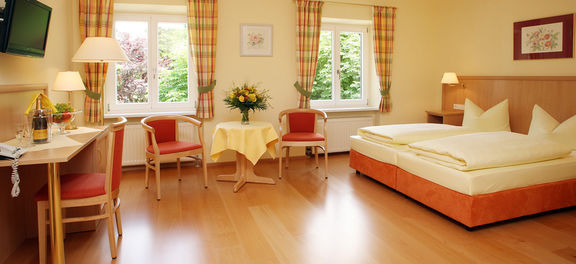From the judges’ home to Hotel Aurauchhof
Almost every of Bavarian judge, prosecutor and solicitor will has been at least once at a meeting in the "Richterheim" (“Judges' home”) in Fischbachau.
The story of the “Richterheim” in Fischbachau is inseparable connected to Dr. Hermann Schmitt. He founded the “Richterheim” in the years after the first World War.
It was a time of increasingly rapid progress of inflation and the associated poverty within the population. The plight of those years also made its way to the officials, particularly judges and prosecutors.
Especially the officials where hit by economic hardship in a truly alarming fashion. Many of the officials were hardly able to pay for their necessary expenses. The officals could not afford recreational trips during the holidays at all. Even worse was the situation of the bereaved.
This poverty has led to materialism and selfishness in the civil service. The ideological orientation of values, solidarity and collegiality of the profession waned rapidly. For the former bureau chief of the Bavarian State Ministry of Justice, Assistant Secretary Dr. Hermann Schmitt this was the cause to establish rehabilitation centers for judges and prosecutors. He managed to inspire even Bavarian Lawyers for his idea. On Nov 11th 1921 he was able to found the "recreation homes of Bavaria" as a company. This company should be the bearer of the judges' homes. Shareholders were the Bavarian judges association and the Bavarian notary association.
On Dec. 30th 1921 the pension "Wilhelmsbad" in Bad Aibling and shortly thereafter on Feb. 6th the "Fremdenheim zum Breitenstein" in Fischbachau were acquired. The "Fremdenheim zum Breitenstein" was a small one-story building that was built in 1913 and contained 48 beds.
After minor modifications, the two judges' homes were opened on April 1st 1922 for guests. The response was so positive that the two rest homes were sold out constantly, and many interested parties had to be called of. Thanks to enthusiasm for the convalescent home in Fischbachau executives started to expand it immediately.
Little by little, the number of guest rooms was expanded from 43 to 75 rooms to a capacity of 125 beds. In the context of these developments substantial expenses for land purchases were made to create an adjoining park. The construction of the park area turned out to be difficult because of the marshes that had to be drained tediously.
Nevertheless, the work continued intensively and with extensions such as the large dining hall and a bowling alley. On Jan 1st 1928 the expanded building was opened for guests. One land transfer was not quite voluntary though: The executives were told that a Dutch company was about to build a lime plant right next to their building. This lime plant and its surroundings would have threatened the existence of the judges' home. To avert this, the entire land in question was acquired as "blocking property" und thus the facility obtained it's own hill. It is still named after the wife of the State Council ("Karolinenhöhe").
It is worth mentioning that in these years the manager of the "Erholungsheim Bayern GmbH" and the judge of the Bavarian State Ministry of Justice was the later Prime Minister Hans Ehard.
Under the auspices of Bavarian Ministry of Justice, the Bavarian judges association and the Bavarian notary association, both clubs in the League of National Socialist German Jurists, founded a public foundation, the society "Erholungsheim Bayern" as proposed by State Council, Dr. Schmitt.
The effects of war also left their marks on the judges' home in Fischbachau. From October 1940, the home was partly used for resettlement or evacuation. From spring 1942 to autumn 1942, the rest home was used for children's vocations ("Kinderlandverschickung "). From summer 1943, the entire house turned into a branch of the Munich hospital "Rechts der Isar" and remained there until the mid 1950s.
After the release of the house in the summer of 1950, the house was in very bad condition. The foundation had to sell its property in Bad Aibling, to allow for the renovation of the judge's home in Fischbachau and the reopening of the purposes of the Foundation.
The judges' home again enjoyed its popularity in the '60s and '70s. Unfortunately, since the mid-70s the numbers of nights of recreation seekers in Fischbachau went back.
As part of the amended holiday behavior, the Foundation was forced to undertake a fundamental redesign of the house. First, the guest rooms have been brought up to modern standards with showers and toilets. In the mid-80s another major new building and a conference building were added to the estate in Fischbachau.
In those years, the change took the "judges' home" to a modern conference hotel, the "Hotel Aurachhof".
